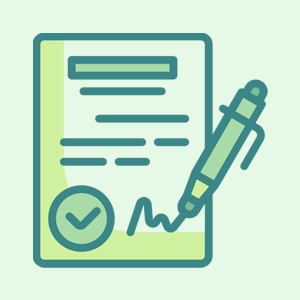 Congratulations! Months of strategic planning and plenty of hard work have paid off. And you’ve finally gotten your project off the ground. Before you start working on your next project, though, you must ensure you have the contracts and related documents are ready and signed off.
Congratulations! Months of strategic planning and plenty of hard work have paid off. And you’ve finally gotten your project off the ground. Before you start working on your next project, though, you must ensure you have the contracts and related documents are ready and signed off.
Between contract creation, negotiation, approval, and final execution, the number of tasks to do can be overwhelming. But with a well-structured contract management process, you’ll make the contract lifecycle as easy and stress-free as possible. Here are the top five contract management strategies to get you started!
1. Run background checks.
Let’s say you work for an account based marketing firm. Of course, your main goal is to bring in the right people to your client’s door. Thus, to build business buy-in and generate more revenue for your clients, you must be sure that the accounts you are targeting are ideal for your clients. And for that, you need to vet every individual or company before approaching them for a collaboration. Whatever collaboration or vendors you use it’s important to vet them.
Instincts play a role in determining which clients are a good fit, but background checks can help confirm those instincts. Additionally, background checks take the responsibility off your employees, protect your investment, and help you make decisions faster. Another good practice is to review the other party’s legal background and existing commitments before signing any contract. This will help you determine the impact of the new agreement on them.
2. Assign a point of contact.
To run a project efficiently, it’s important that everyone understands who has the power to make final decisions. Senior directors or board members can’t preside over all meetings. However, it should be clear who can act on their behalf. Clarify which questions require answers from the approving officers to complete contracts.
A single point of contact with clients helps maintain accurate records, keep clients informed, and provide better service. This is particularly important for large projects, as it allows you to track client requests and changes in a few seconds. It also helps clients stay organized and assures them of prompt customer service. When clients have one dedicated contact person, they know who to reach out to for quick troubleshooting.
3. Automate the contract lifecycle.
Contract automation can translate to higher closing rates and shorter sales cycles. It also streamlines contract administration processes for better visibility, search ability, and retrieval of critical information. By doing so, it saves time and resources and improves accuracy and efficiency.
B2B enterprises can implement contract automation software to create standardized contract templates and simplify their contracting process. Standardization helps ensure that all contracts have a uniform language, format, and content, decreasing the likelihood of conflicts or confusion.
It is also imperative to keep accurate and comprehensive contract records for monitoring obligations and ensuring compliance. Contract management software helps achieve this by storing and tracking data for a clear and complete audit trail. It also automates sending contracts for signature and alerting stakeholders to upcoming deadlines.
4. Build a digital contract archive.
Efficient contract management relies on having real-time visibility of all relevant contract information. To achieve this, set up a centralized, digital archive that holds all contracts and contract-related metadata. That way, everyone involved in the contracting process can securely access the information they need, irrespective of their location or time zone.
For further convenience, consider categorizing the archive according to your contract’s type, usage, status, priority, and risk level. The only downside is that while this cloud-based archive improves accessibility, it also increases the exposure to data breaches. The good news, however, is if you cannot avoid the risk of unauthorized access or data alteration, you can mitigate it. And the best way to do it is by implementing role-based access controls to edit, delete, and share sensitive information.
5. Make sure everything (and everyone) is in sync.
The key to maximizing your contract’s potential is to ensure that all the processes, policies, and departments are in perfect sync. This approach consists of four steps to help you foster understanding and coordination among all parties involved.
Firstly, define your contract lifecycle management (CLM) policies, which serve as the basis for creating terms and conditions within a contract. Secondly, prioritize key contracts by measuring their outcomes and identifying those that bring more value than others. Thirdly, identify opportunities for process optimization by periodically analyzing your process and tracking performance metrics. Lastly, ensure that your team, suppliers, and stakeholders know the objectives, priorities, and responsibilities. By following these steps, you can build a seamless flow of collaboration and communication across all areas of operations.
Final Thoughts
Effective contract management indeed requires ongoing dedication and effort. But if executed well, its benefits make it a valuable investment for any B2B enterprise. So, use these five strategies to streamline your B2B contracting processes and lessen the risk of legal disputes or breaches.
Author Bio:
Qurat-ul-Ain Ghazali, aka Annie, is the growth manager at Contractbook and looks after all the organic channels. She has been with tech start-ups and scale-ups for a couple of years with a B2B focus. You can find her socializing, traveling, indulging in extreme sports, and enjoying the local desserts when she is not working.
